最新英语中并列句的四种类型
英语并列句的定义
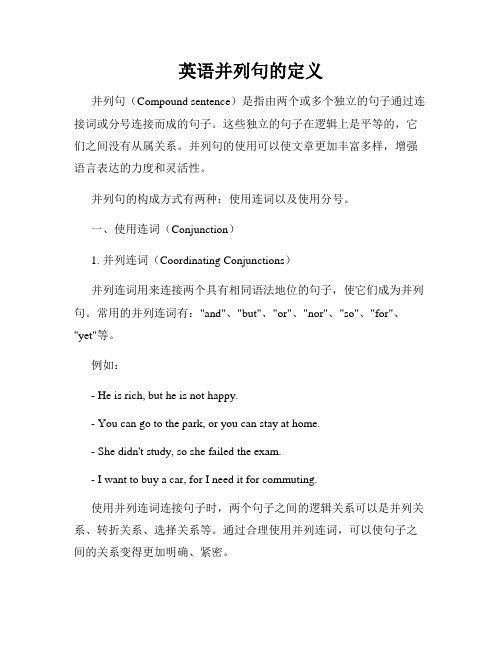
英语并列句的定义并列句(Compound sentence)是指由两个或多个独立的句子通过连接词或分号连接而成的句子。
这些独立的句子在逻辑上是平等的,它们之间没有从属关系。
并列句的使用可以使文章更加丰富多样,增强语言表达的力度和灵活性。
并列句的构成方式有两种:使用连词以及使用分号。
一、使用连词(Conjunction)1. 并列连词(Coordinating Conjunctions)并列连词用来连接两个具有相同语法地位的句子,使它们成为并列句。
常用的并列连词有:"and"、"but"、"or"、"nor"、"so"、"for"、"yet"等。
例如:- He is rich, but he is not happy.- You can go to the park, or you can stay at home.- She didn't study, so she failed the exam.- I want to buy a car, for I need it for commuting.使用并列连词连接句子时,两个句子之间的逻辑关系可以是并列关系、转折关系、选择关系等。
通过合理使用并列连词,可以使句子之间的关系变得更加明确、紧密。
2. 连接副词(Correlative Adverbs)连接副词是一种特殊类型的连接词,它常常用来连接两个句子,形成并列句。
常用的连接副词有:"both...and"、"either...or"、"neither...nor"、"not only...but also"等。
例如:- Both Tom and Mary are going to the party.- You can either stay at home or go shopping.- Neither John nor Sarah is available today.- Not only does he play the guitar, but he also sings beautifully.连接副词的使用可以在表达中强调两个句子之间的相似性、选择性或者转折性。
(完整word版)我 并列句讲解及练习
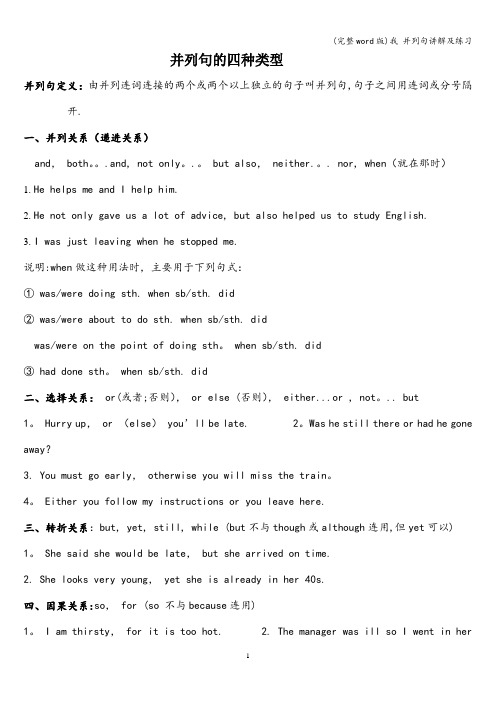
并列句的四种类型并列句定义:由并列连词连接的两个或两个以上独立的句子叫并列句,句子之间用连词或分号隔开.一、并列关系(递进关系)and, both。
.and, not only。
.。
but also, neither.。
. nor, when(就在那时)1.He helps me and I help him.2.He not only gave us a lot of advice, but also helped us to study English.3.I was just leaving when he stopped me.说明:when做这种用法时,主要用于下列句式:① was/were doing sth. when sb/sth. did② was/were about to do sth. when sb/sth. didwas/were on the point of doing sth。
when sb/sth. did③ had done sth。
when sb/sth. did二、选择关系:or(或者;否则), or else (否则), either...or , not。
.. but1。
Hurry up, or (else) you’ll be late. 2。
Was he still there or had he gone away?3. You must go early, otherwise you will miss the train。
4。
Either you follow my instructions or you leave here.三、转折关系:but, yet, still, while (but不与though或although连用,但yet可以)1。
She said she would be late, but she arrived on time.2. She looks very young, yet she is already in her 40s.四、因果关系:so, for (so 不与because连用)1。
最新英语中并列句的四种类型

精品文档英语中并列句的四种类型一、联合关系),when(=and just at this time 同,和常用的连词有and( 而……), not only…but (also)…( 不仅就在这时,然后)等。
如:也不……(既不且……), neither…nor………他帮我,我帮他。
He helps me and I help him.He not only gave us a lot of advice, but also helped us to他不仅给我们出很多建议并且还帮助我学英study English. 语。
我正要离开,I was just leaving when the telephone rang.电话铃响了。
when 作这种用法时,主要用于注:was/were doing sth. when sth./sb. did;was/were about to do sth. when sth./sb. did;was/were on the point of doing sth. when sth./sb. did就在这时当某人或某物正在或正要做某事,等句型中,表示“。
突然又发生了另一事”精品文档.精品文档二、选择关系), or ), otherwise( 否则or( 或者,否则常用的连词有) 。
如:不是……就是else( 否则), either...or(Hurry up, or (else) you'll be late. 快点,否则就会迟到了。
你那时还Will he still be there or will he have gone away? 在那里还是可能已经走了?你好得You must go early, otherwise you will miss the bus.早点走,否则就赶不上公共汽车了。
不是汤姆就是她的Either Tom is coming or his sisters are.姐妹们要来。
英语并列句
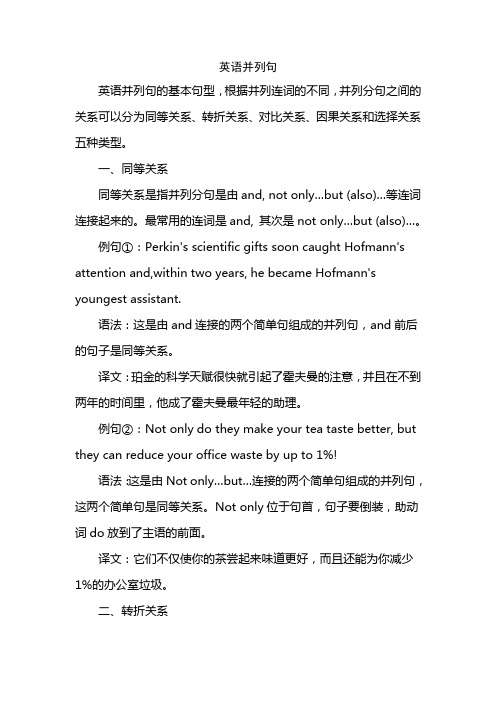
英语并列句英语并列句的基本句型,根据并列连词的不同,并列分句之间的关系可以分为同等关系、转折关系、对比关系、因果关系和选择关系五种类型。
一、同等关系同等关系是指并列分句是由and, not only…but (also)…等连词连接起来的。
最常用的连词是and, 其次是not only…but (also)…。
例句①:Perkin's scientific gifts soon caught Hofmann's attention and,within two years, he became Hofmann's youngest assistant.语法:这是由and连接的两个简单句组成的并列句,and前后的句子是同等关系。
译文:珀金的科学天赋很快就引起了霍夫曼的注意,并且在不到两年的时间里,他成了霍夫曼最年轻的助理。
例句②:Not only do they make your tea taste better, but they can reduce your office waste by up to 1%!语法:这是由Not only…but…连接的两个简单句组成的并列句,这两个简单句是同等关系。
Not only位于句首,句子要倒装,助动词do放到了主语的前面。
译文:它们不仅使你的茶尝起来味道更好,而且还能为你减少1%的办公室垃圾。
二、转折关系转折关系是指并列分句是由but连接起来的。
例句:Over the past 40 years, most have abandoned their nomadic ways and settled in the territory's 28 isolated communities, but they still rely heavily on nature to provide food and clothing.语法:这是由but连接的两个简单句组成的并列句,but前后的句子是转折关系。
高中英语 并列(复合)句 课件
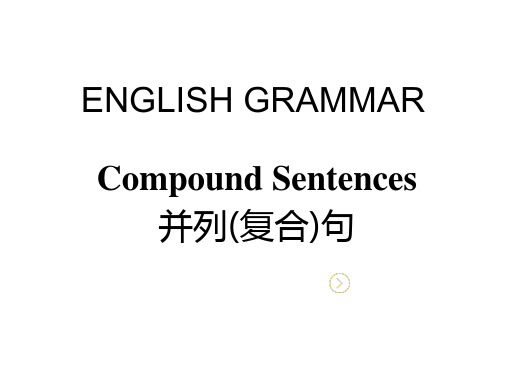
请按照下列提纲整理笔记。
并列(复合)句 一、带并列连词的并列句 (4种关系及常用的连词) 二、带连接副词的并列句 (常见的连接副词;用法) 三、when用于并列句 (3种结构) 四、 and与or/otherwise用于并列句 (2种结构)
二、并列句的句式
2. and与or/otherwise用于并列句 (1) 祈使句+and+一般将来时,“做……,就会……”。 (2) 祈使句+or/otherwise+一般将来时,“做……,否则就 会……”。 Go through this gate, and you’ll see the house on your left.(你 穿过这道大门,就看到左面的房子了。) One more word, and I’ll knock you flat.(再多说一句话,我就 把你揍扁了。)(有时祈使句部分也可用名词短语代替。) Hurry up, or/otherwise you will be late for class.(快点儿,否 则你们上课就迟到了。)
注:①主谓一致中的就近原则:neither...nor...,not only... but also...和not...but连接并列主语时,谓语动词和邻近的主语保持一 致。如:Neither you nor I am to blame.(你和我都不该受责备。)
②倒装:not only...but also...在连接并列分句时,如果not only 置于句首,not only所在的句子要用部分倒装。如:Not only will help be given to people to find jobs, but also medical treatment will be provided for people who need it.(不仅帮助人们找工作而且也为需 要的人提供医疗护理。)
并列句(四种)
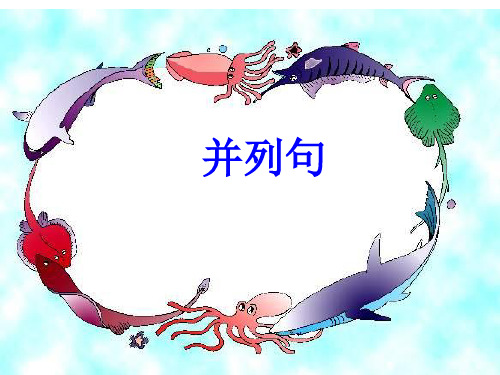
teacher never spoke English like that! The
porter and I looked at each other _a_n_d_smiled.
She’s good at English, but her Chinese isn’t good.
He worked hard, yet he failed.
Tom is tall while his brother is short.
I’d like to go with you, however my hands are full.
Jim finished his homework and he went to bed. 不但我到校早,而且我的老师也是如此。
Not only I come to school early, but also my teacher does.
2.转折并列句
并列连词:but(但是), however(然而), yet(但是), while(而,然而)等,表意思转折或对比 。
并列句
定义
并列句是由and, but, or, for等并列 连词把两个或两个以上意义有关的简 单句连在一起而构成的句子。其结构 为:简单句+并列连词+简单句。
1. 联合并列句
并列连词:and(和、并且), 其中and意为“和、又、 而”,表示动作先后等,not only...but also...(不 但……而且……)等。 吉姆写完作业,就上床睡觉了。
A. and B. though C. because D. or 4. I came to see her, ___A_____ she wasn’t at home.
并列英文短语有哪些

并列英文短语有哪些在英语中写作中,为了使阅卷老师不容易产生疲劳感,我们一般会用并列句,使句子看起来不是太长。
下面是店铺给大家整理并列英文短语表达,供大家参阅!并列英文短语表达1. 按使用目的,句子可分为陈述句、疑问句、祈使句和感叹句四类;2. 句子按其结构可以分为简单句、并列句、复合句三类。
下面就考试中常见的并列句和复合句做简单介绍。
(一)并列句1. 由and、but、or、so、for等并列连词把两个简单句连接起来而成的。
例如:John likes playing basketball, but he didn’t play it yesterday. 约翰喜欢打篮球,但他昨天没打。
You should hurry, or you will miss the train. 你该快点了,否则要误车了。
He must be a good student, for he is always careful with his lessons. 他肯定是个好学生,因为他学习一直很认真仔细。
2. 由并列连词词组连接成的。
常用的有not only … but also … , either … or … , neither … nor … , not … but …, both … and …, 等等。
例如:Not only one but also all of us were invited. 不只是一个,而是我们全体都受到邀请。
Either you do it, or I ask for somebody else to do it. 要么你来做,要么我请其他人来做。
Neither Tom nor Jack has finished the homework. 汤姆和杰克都没有完成作业。
Not couldn’t they complete the task, but the task was too tough. 不是他们完不成任务,而是任务太重了。
并列句的结构
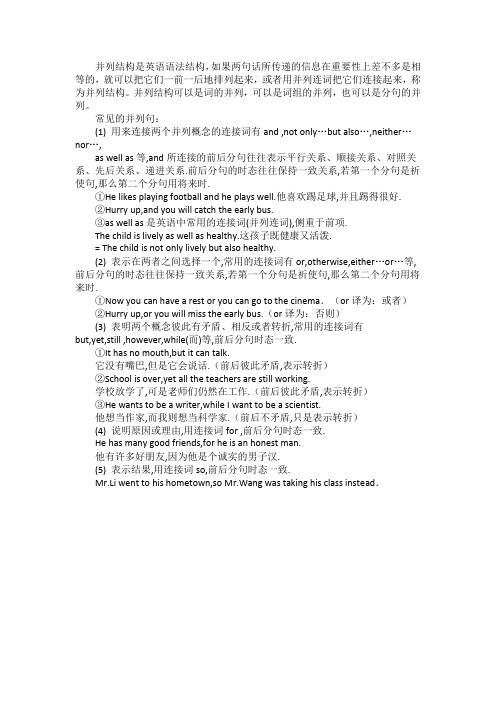
并列结构是英语语法结构,如果两句话所传递的信息在重要性上差不多是相等的,就可以把它们一前一后地排列起来,或者用并列连词把它们连接起来,称为并列结构。
并列结构可以是词的并列,可以是词组的并列,也可以是分句的并列。
常见的并列句:(1) 用来连接两个并列概念的连接词有and ,not only…but also…,neither…nor…,as well as等,and所连接的前后分句往往表示平行关系、顺接关系、对照关系、先后关系、递进关系.前后分句的时态往往保持一致关系,若第一个分句是祈使句,那么第二个分句用将来时.①He likes playing football and he plays well.他喜欢踢足球,并且踢得很好.②Hurry up,and you will catch the early bus.③as well as是英语中常用的连接词(并列连词),侧重于前项.The child is lively as well as healthy.这孩子既健康又活泼.= The child is not only lively but also healthy.(2) 表示在两者之间选择一个,常用的连接词有or,otherwise,either…or…等,前后分句的时态往往保持一致关系,若第一个分句是祈使句,那么第二个分句用将来时.①Now you can have a rest or you can go to the cinema.(or译为:或者)②Hurry up,or you will miss the early bus.(or译为:否则)(3) 表明两个概念彼此有矛盾、相反或者转折,常用的连接词有but,yet,still ,however,while(而)等,前后分句时态一致.①It has no mouth,but it can talk.它没有嘴巴,但是它会说话.(前后彼此矛盾,表示转折)②School is over,yet all the teachers are still working.学校放学了,可是老师们仍然在工作.(前后彼此矛盾,表示转折)③He wants to be a writer,while I want to be a scientist.他想当作家,而我则想当科学家.(前后不矛盾,只是表示转折)(4) 说明原因或理由,用连接词for ,前后分句时态一致.He has many good friends,for he is an honest man.他有许多好朋友,因为他是个诚实的男子汉.(5) 表示结果,用连接词so,前后分句时态一致.Mr.Li went to his hometown,so Mr.Wang was taking his class instead.。
高考英语写作技法系列2熟悉四种并列关系,写好并列句外研

(3)并列句有时也可不用并列连词连接, 而用标点符号 分号(; )连接。例如: The future is bright; the road is tortuous. 前途是光明的, 道路是曲折的。
【即时应用】 1. 用适当的并列连词填空 ①He couldn’t know the truth about me, _o_r_/o_t_h_e_r_w_i_se_ he wouldn’t treat me like this. ②The bell is ringing _a_n_d_the lesson is over. ③He was ill, _b_u_t_/y_e_t_ he kept on working. ④He doesn’t talk much, _b_u_t_/y_e_t_ he thinks a lot.
②Family offers me warmth and care. Friends give me strength and horizons. _F_a_m__il_y_o_f_f_e_r_s _m__e _w_a_r_m__t_h_a_n_d__c_a_r_e_w_h__il_e_f_r_ie_n_d_s__g_iv_e_ _m__e_s_tr_e_n_g_t_h__a_n_d_h_o_r_i_z_o_n_s_.
பைடு நூலகம்
③Remember, being polite costs nothing. Being polite is worth millions of dollars. _R_e_m__e_m__b_e_r,_b_e_i_n_g_p__o_li_te__c_o_st_s_n_o_t_h_i_n_g_, _b_u_t_i_t_i_s _w_o_r_t_h_ _m_i_ll_io_n__s _o_f_d_o_l_la_r_s_.
并列句英语

并列句英语由并列连词连接、含有两个或更多主谓结构的句子叫并列句。
并列句的基本句型:简单句+ 并列连词+ 简单句并列连词有表示转折对比关系,因果等。
1. 并列句:由两个或两个以上的简单句并列连接起来的句子叫并列句。
2. 并列句的基本句型:简单句+ 并列连词+ 简单句3. 并列句的类型:1) 并列关系(联合关系)。
连接词:and, not onlybut (also), neithernor 等例句:I help him and he helps me.我帮助他,他也帮助我。
Not only did we write to her but also we telegraphed her.我们不仅给她写信而且还给她发了电报。
Neither I would consult him nor he would ask me for advice.我不想与他商量,他也不会征求我的意见。
2) 转折关系。
连接词:but, yet, still, while, however, when等例句:He failed many times, but he didnrsquo;t despair.他失败多次但并没有气馁。
She has difficulty in learning English, however, she works hard and is making rapid progress.她学习英语有困难,然后她学习努力,进步很快。
3) 选择关系。
连接词:or, otherwise or else, eitheror例句:We must hurry, or wersquo;ll miss the train.我们必须快点,否则会赶不上火车。
Either you come to my place or I go to yours.或者你到我这儿来,或者我到你那去。
4) 因果关系。
连接词:for, so, thus, therefore, and so例句:We had better stay at home, for it was raining.我们最好呆在家里,因为天正在下雨。
英语并列句

并列句由并列连词连接、含有两个或更多主谓结构的句子叫并列句。
通常的并列连词,根据所连接的上下文的逻辑关系,可以分为以下几类:一、表示转折对比关系的并列连词1. but但是,可是,而,却连接两个简单句,有时句中某些词可以省略;连接两个并列成分,可以放在一个句子的句首,后面不接逗号。
例:I hope you don't mind me asking ,but where did you buy thoseshoes ?2. yet但是;尽管如此可连接两个句子,用逗号分开,也可在yet 前加and,还可以放在一个句子的句首。
例:The car is old,yet it is in good condition.3. while而,但是,可是,却while 作连词用时,可表示对比或转折关系。
例:I do every single bit of housework while my husband Bob just doesthe dishes now and then.(补充)however “但是,然而”,副词,常用逗号和句子分开,可位于句中,句尾,句首。
He said that it was so;he was mistaken,however.二、表示因果关系的并列连词1. for因为由并列连词for 引导的分句常置于句子后部,而且常用逗号与前面的分句隔开。
for 分句主要是对前一分句补充说明理由或推断原因。
for 分句不能用来回答why 问句。
It must have rained last night, for it is wet all over.2. so 因此可以连接两个句子,中间有时用逗号隔开;也可在so前加and ;还可以放在一个句子的句首。
例:The shop were closed so I didn’t get any milk. (注)a. 并列连词so不可与从属连词because 连用。
【英语语法】英语四类典型并列句
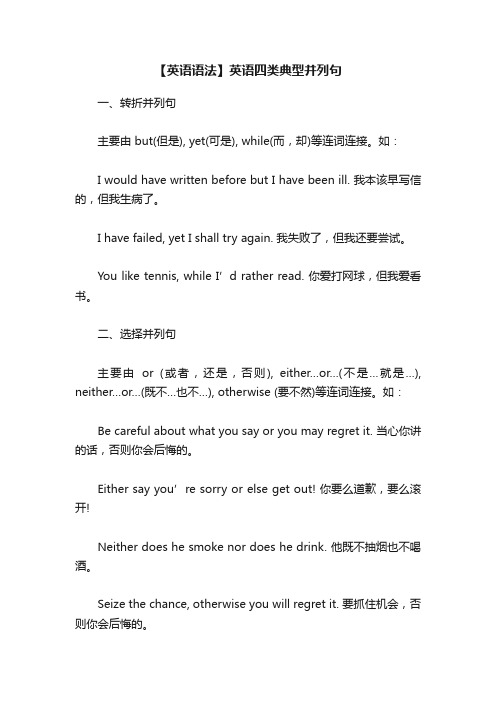
【英语语法】英语四类典型并列句一、转折并列句主要由 but(但是), yet(可是), while(而,却)等连词连接。
如:I would have written before but I have been ill. 我本该早写信的,但我生病了。
I have failed, yet I shall try again. 我失败了,但我还要尝试。
You like tennis, while I’d rather read. 你爱打网球,但我爱看书。
二、选择并列句主要由or (或者,还是,否则), either…or…(不是…就是…), neither…or…(既不…也不…), otherwise (要不然)等连词连接。
如:Be careful about what you say or you may regret it. 当心你讲的话,否则你会后悔的。
Either say you’re sorry or else get out! 你要么道歉,要么滚开!Neither does he smoke nor does he drink. 他既不抽烟也不喝酒。
Seize the chance, otherwise you will regret it. 要抓住机会,否则你会后悔的。
注:neither…nor…连接两个句子,注意用倒装语序。
三、联合并列句主要由and, not only…but also…(不但…而且…), when(=and just at this time 就在这时)等连词连接。
如:Give him an inch and he will take a mile. 他会得寸进尺。
Not only did he speak more correctly, but he spoke more easily. 不仅他讲得更正确,也讲得更不费劲了。
He was about to go to bed when the telephone rang. 他正要上床睡觉,这时电话铃响了起来。
英语中并列句的四种类型

英语中并列句的四种类型并列句概念两个或两个以上的简单句用并列连词连在一起构成的句子,叫做并列句,其基本结构是“简单句+并列连词+简单句”。
并列连词有:and, but, or, so等.并列句中的各简单句意义同等重要,相互之间没有从属关系,是平行并列的关系。
它们之间用连词连结。
如:I like action movies but don't like thrillers.Hurry up or you'll be late. (快点,否则你要迟到了。
)and, or和but都是连词,在句中连接两个或两个以上的并列成分。
可连接两个词,两个短语,两个分句,但所连接的两个成分必须一致,绝不能一个是词,一个是句子。
如:I like red and orange.He isn't my brother or my friend.I like playing football and swimming.and 的意思是“和”,表示前后两个成分的并列或对称关系;or的意思是“或者”、“否则”、“要不然”,表示两个成分并列或选择关系;but 的意思是“但是”,表示两个成分之间的转折关系。
并列句中:1.表并列关系的由and,both...and,as well as,not only...but (also),neither...nor等组成。
She not only sings but also dance.2.表转折关系的与but,however(然而),while(然而),still,yet等连用。
The film is not perfect,still,it's good.3.表选择关系的由or,either...or...,not...but...,or else(否则)连接Take the chance,or else you will regret(后悔) it.4.表因果关系的与for,so/so that,therefore(因此),because等连用。
英语语法精粹:并列句
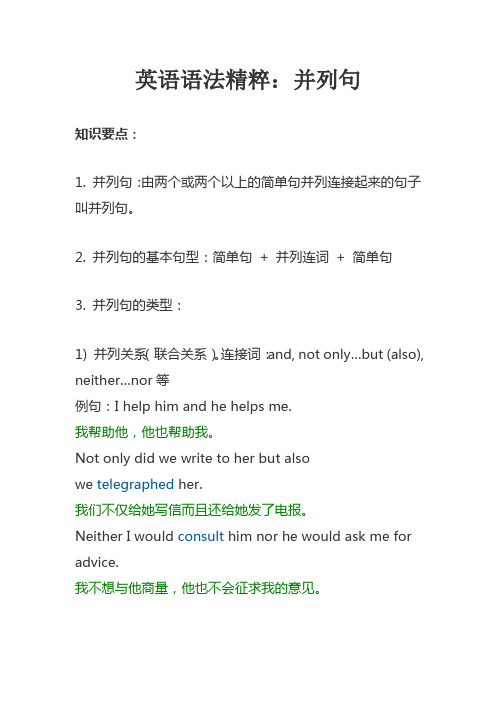
英语语法精粹:并列句知识要点:1. 并列句:由两个或两个以上的简单句并列连接起来的句子叫并列句。
2. 并列句的基本句型:简单句+ 并列连词+ 简单句3. 并列句的类型:1) 并列关系(联合关系)。
连接词:and, not only…but (also), neither…nor等例句:I help him and he helps me.我帮助他,他也帮助我。
Not only did we write to her but alsowe telegraphed her.我们不仅给她写信而且还给她发了电报。
Neither I would consult him nor he would ask me for advice.我不想与他商量,他也不会征求我的意见。
2) 转折关系。
连接词:but, yet, still, while, however, when 等例句:He failed many times, but he didn’t despair. 他失败多次但并没有气馁。
She has difficulty in learning English, however, she works hard and is making rapid progress.她学习英语有困难,然后她学习努力,进步很快。
3) 选择关系。
连接词:or, otherwise or else, either…or 例句:We must hurry, or we’ll miss the train.我们必须快点,否则会赶不上火车。
Either you come to my place or I go to yours.或者你到我这儿来,或者我到你那去。
4) 因果关系。
连接词:for, so, thus, therefore, and so 例句:We had better stay at home, for it was raining. 我们最好呆在家里,因为天正在下雨。
英语并列句的四种基本类型
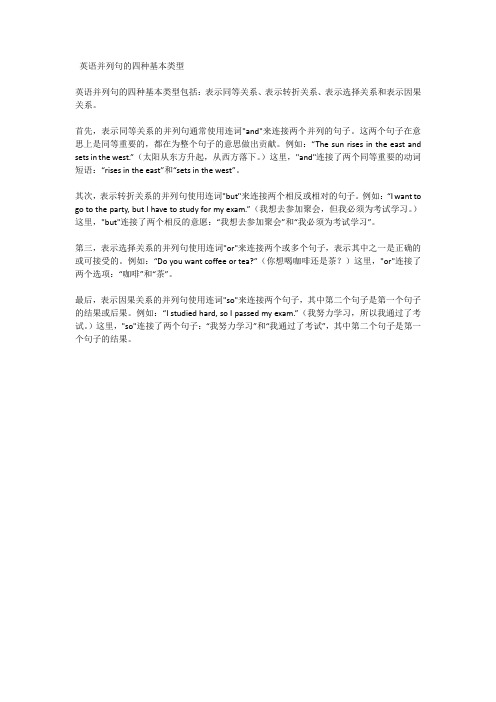
英语并列句的四种基本类型英语并列句的四种基本类型包括:表示同等关系、表示转折关系、表示选择关系和表示因果关系。
首先,表示同等关系的并列句通常使用连词"and"来连接两个并列的句子。
这两个句子在意思上是同等重要的,都在为整个句子的意思做出贡献。
例如:“The sun rises in the east and sets in the west.”(太阳从东方升起,从西方落下。
)这里,"and"连接了两个同等重要的动词短语:“rises in the east”和“sets in the west”。
其次,表示转折关系的并列句使用连词"but"来连接两个相反或相对的句子。
例如:“I want to go to the party, but I have to study for my exam.”(我想去参加聚会,但我必须为考试学习。
)这里,"but"连接了两个相反的意愿:“我想去参加聚会”和“我必须为考试学习”。
第三,表示选择关系的并列句使用连词"or"来连接两个或多个句子,表示其中之一是正确的或可接受的。
例如:“Do you want coffee or tea?”(你想喝咖啡还是茶?)这里,"or"连接了两个选项:“咖啡”和“茶”。
最后,表示因果关系的并列句使用连词"so"来连接两个句子,其中第二个句子是第一个句子的结果或后果。
例如:“I studied hard, so I passed my exam.”(我努力学习,所以我通过了考试。
)这里,"so"连接了两个句子:“我努力学习”和“我通过了考试”,其中第二个句子是第一个句子的结果。
英语写作基础篇之并列句
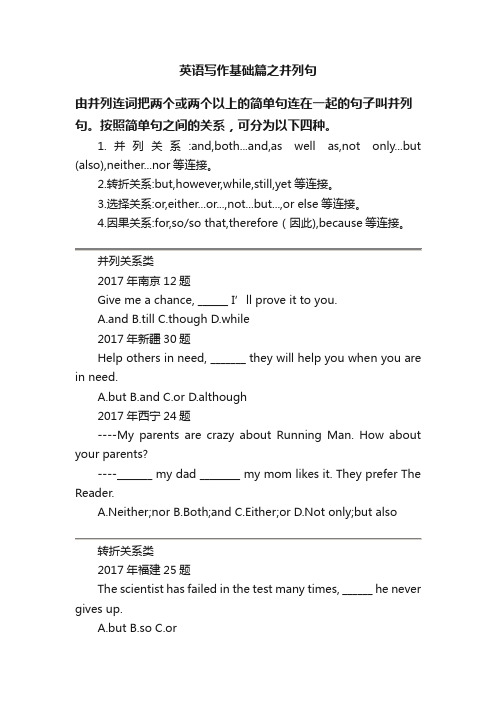
英语写作基础篇之并列句由并列连词把两个或两个以上的简单句连在一起的句子叫并列句。
按照简单句之间的关系,可分为以下四种。
1.并列关系:and,both...and,as well as,not only...but (also),neither...nor等连接。
2.转折关系:but,however,while,still,yet等连接。
3.选择关系:or,either...or...,not...but...,or else等连接。
4.因果关系:for,so/so that,therefore(因此),because等连接。
并列关系类2017年南京12题Give me a chance, ______ I’ll prove it to you.A.andB.tillC.thoughD.while2017年新疆30题Help others in need, _______ they will help you when you are in need.A.butB.andC.orD.although2017年西宁24题----My parents are crazy about Running Man. How about your parents?----_______ my dad ________ my mom likes it. They prefer The Reader.A.Neither;norB.Both;andC.Either;orD.Not only;but also转折关系类2017年福建25题The scientist has failed in the test many times, ______ he never gives up.A.butB.soC.or选择关系类2017年天津36题----Which do you prefer, traditional Western music ______ pop music?----Pop music.A.butB.asC.orD.from2017年安徽36题Hold your dream, _______ you might regret some day.A.andB.orC.butD.so2017年江西28题We must go back to work, _______ we won’t finish everything.A.andB.butC.soD.or2017年呼和浩特7题_______ Lucy ______ you can’t go to the party. One of you has to stay at home to look after your grandma.A.Neither;nor B:Either;or C.Not only;but also D.Both;and因果关系类2017年上海42题The two companies decided to work together _______ they had common interest.A.becauseB.unlessC.butD.or2017年天津39题It’s not always safe to pay over the Internet, _______ you should be careful.A.soB.afterC.becauseD.as soon as2017年山东临沂21题My arm is still painful, ________ I’m going to see a doctor.A.soB.forC.butD.or综合关系类2017年武汉32题----I don’t like reading ______ watching TV. What about you?----I don’t like reading all day, ______ I like watching TV news.A.and;orB.and; andC.or;andD.or;but总体来看,转折关系和综合类关系出现几率最低,并列类、因果类和选择类稍多。
英语中并列句的四种类型之欧阳理创编
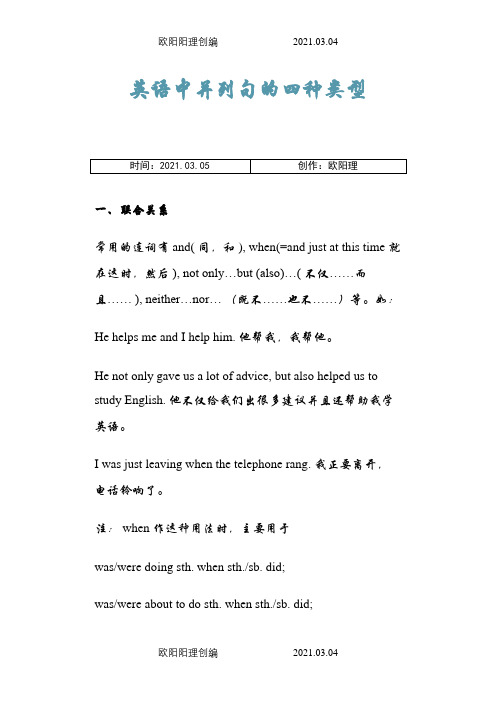
英语中并列句的四种类型一、联合关系常用的连词有 and( 同,和 ), when(=and just at this time 就在这时,然后), not only…but (also)…( 不仅……而且…… ), neither…nor… (既不……也不……)等。
如:He helps me and I help him. 他帮我,我帮他。
He not only gave us a lot of advice, but also helped us to study English. 他不仅给我们出很多建议并且还帮助我学英语。
I was just leaving when the telephone rang. 我正要离开,电话铃响了。
注: when 作这种用法时,主要用于was/were doing sth. when sth./sb. did;was/were about to do sth. when sth./sb. did;was/were on the point of doing sth. when sth./sb. did等句型中,表示“当某人或某物正在或正要做某事,就在这时突然又发生了另一事”。
二、选择关系常用的连词有 or( 或者,否则 ), otherwise( 否则 ), or else( 否则 ), either...or( 不是……就是 ) 。
如:Hurry up, or (else) you’ll be late. 快点,否则就会迟到了。
Will he still be there or will he have gone away? 你那时还在那里还是可能已经走了?You must go early, otherwise you will miss the bus. 你好得早点走,否则就赶不上公共汽车了。
Either Tom is coming or his sisters are. 不是汤姆就是她的姐妹们要来。
- 1、下载文档前请自行甄别文档内容的完整性,平台不提供额外的编辑、内容补充、找答案等附加服务。
- 2、"仅部分预览"的文档,不可在线预览部分如存在完整性等问题,可反馈申请退款(可完整预览的文档不适用该条件!)。
- 3、如文档侵犯您的权益,请联系客服反馈,我们会尽快为您处理(人工客服工作时间:9:00-18:30)。
英语中并列句的四种类型一、联合关系常用的连词有and( 同,和), when(=and just at this time 就在这时,然后), not only…but (also)…( 不仅……而且…… ), neither…nor… (既不……也不……)等。
如:He helps me and I help him. 他帮我,我帮他。
He not only gave us a lot of advice, but also helped us to study English. 他不仅给我们出很多建议并且还帮助我学英语。
I was just leaving when the telephone rang. 我正要离开,电话铃响了。
注:when 作这种用法时,主要用于was/were doing sth. when sth./sb. did;was/were about to do sth. when sth./sb. did;was/were on the point of doing sth. when sth./sb. did等句型中,表示“当某人或某物正在或正要做某事,就在这时突然又发生了另一事”。
二、选择关系常用的连词有or( 或者,否则), otherwise( 否则), or else( 否则), either...or( 不是……就是) 。
如:Hurry up, or (else) you’ll be late. 快点,否则就会迟到了。
Will he still be there or will he have gone away? 你那时还在那里还是可能已经走了?You must go early, otherwise you will miss the bus. 你好得早点走,否则就赶不上公共汽车了。
Either Tom is coming or his sisters are. 不是汤姆就是她的姐妹们要来。
三、转折关系常用的连词有but( 但是,可是,只是因为), while( 而、却), yet( 可是) 等。
如:It never rains but it pours. 祸不单行。
I like tea while she likes coffee. 我喜欢喝茶而她喜欢喝咖啡。
She said she would be late, yet she arrived on time. 她说她会迟到,但她却准时到达了。
She looks very young, but she is already in her 30’s. 她看上去很年轻, 可是她已三十多岁了。
此处,还有副词still( 仍然),however( 然而) 也表示转折关系。
He is good-natured; still I don''t like him. 他脾气很好, 可是我还是不喜欢他。
The book is expensive; however, it''s worth it. 这本书很贵;却很值。
注意:but, while 不与although 连用,但yet, still 可与although 连用。
Although she felt ill, she still went to work. 她虽然感觉不舒服,但她仍然去上班。
四、因果关系常用的连词有for (因为)和so (所以,因此)等。
如:I am thirsty, for it is hot. 我口渴,因为天气太热。
The manager was ill so I went in her place. 经理病了所以我代她去。
注意:so 不与because 连用复合句用法讲解复合句1、概述复合句(complex sentence)由一个主句(main clause)和一个或一个以上的从句(subordinate clause)构成。
主句是全句的主体,通常可以独立存在;从句则只用作句子的一个成分,不能独立。
After the students were all in the chemistry lab, the teacher brought out three bottles.在学生全都进入化学实验室后,老师拿出三个瓶子来。
(主句是“the teacher brought out three bottles”,从句是“After the students were all in the chemistry lab”。
)Corn is a very useful plant that can be prepared in many different ways.玉米是一种非常有用的作物,可用许多不同的方法制作成食物。
(主句是“Corn is a very useful plant”,从句是“that can be prepared in many different ways”。
)We also believe that many more people will prefer to travel by air.我们还认为会有更多的人愿意乘飞机旅行。
(主句是“We also believe”但意义不完整,从句是“that many more people will prefer to travel by air”。
)2、从句的基本概念及其结构从句不能独立成为一个句子,虽然它也有主语部分和谓语部分。
从句通常由关联词引导,并由关联词将从句和主句联系在一起。
从句的结构通常是:关联词+主语+谓语。
When I came home,my wife was cooking dinner. 我回家时,妻子在做晚饭。
He said that he would come. 他说他要来Did you see the letter that I sent him? 你看到我寄给他的信了吗?Whether the football game will be played depends onthe weather.足球比赛是否举行将视天气而定。
3、关联词(connective)引导从句的关联词共有下列5类:(1)从属连词:that(无词义),before(在…前),whether (是否),after(在…之后),if(假如、是否),since(既然、自从), because(因为),as/so long as(只要),when (当时…候),so that(结果)(2)疑问代词:who, which, whom, what, whose等。
(3)疑问副词:when, why, where, how(4)关系代词:who, which, whom, that, whose(5)关系副词:when, why, where4、关联词在从句中的功用举例We can't travel through the forest by road because therearen't any roads! 我们不能从陆路穿过森林,因为这儿根本没有路可走!(关联词是从属连词because,引导状语从句)I think that it's wrong to eat monkeys, so I don't.我认为吃猴子是不对的,所以我不吃。
(关联词是从属连词that,引导宾语从句,在从句中不作成分)Anybody who breaks the rule is punished. 谁要是破坏了这条规则,谁就要受到惩罚。
(关联词是关系代词who,引导定语从句,在从句中作主语)Although it was expensive, we decided to buy the computer.虽然价钱昂贵,我们还是决定把计算机买下来。
(关联词是从属连词although,引导状语从句)Would you please let me know when you have a match?你们有比赛的时候,请告诉我好吗?(关联词是疑问副词when,引导宾语从句,在从句中作状语)What we need is more time.我们需要的是更多的时间。
(关联词是疑问代词what,引导主语从句,在从句中作宾语)5、从句的功用和种类从句在复合句中,可作主语、表语、宾语、同位语、定语、状语等,因此,可分为六类:即主语从句、表语从句、宾语从句、同位语从句、定语从句和状语从句。
The dam, which is the biggest in the world , is 3,830 metres long.这座水坝是世界上最大的一座,长3830米。
(含有which引导的定语从句)Over 500 people were working in the building when the fire broke out on the llth floor.当11层楼起火的时候,大楼内有500人在工作。
(含有when引导的时间状语从句)The chief editor decides which will be the most important story on the front page. 由主编决定哪篇报导最重要,应安排在头版。
(含有which引导的宾语从句)Whether she will come or not is still a question. 她是否会来仍是一个问题。
(含有whether引导的主语从句)That is where he was born. 这就是他出生的地方。
(含有where引导的表语从句)We heard the news that our team had won. 我们听到了我们球队己经获胜的消息。
(含有that引导的同位语从句)英语词组用法:either…or…的用法either…or…,其意为“要么…要么…”、“不是…就是…”:要么进来,要么出去。
我想去巴黎或伦敦游览一下。
不是他没讲清楚,就是我没听明白。
你喝茶也行,喝咖啡也行。
不是你错,就是我错。
neither...nor...表示"既不……也不……"。
其含义是否定的,可连接任意两个并列的成份。
她既不喜欢黄油也不喜欢乳酪。
她既不聪明,又不勤奋。
今天他和她都不在家。
not only…but also…,其意为“不但…而且…”:选中的不仅有男的也有女的。
他不仅读过这本书,而且还记得书中的内容。
他不但风趣,而且也很机智。
不只是你,他也得离开。
both…and…,其意为“…和…都”、“不但…而且…”、“既…又…”:她不仅会说日语,而且还会写。
